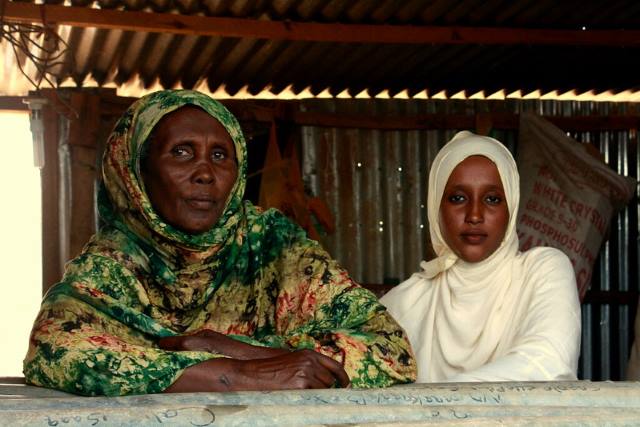Women’s Empowerment in Kakuma Refugee Camp
 The Kakuma Refugee Camp, located in Kenya, was originally established for young children who escaped war in Sudan and Ethiopia. Today, the camp is home to about 200,000 people and facilitates access to education, health care and housing. The efforts of organizations enable and empower women in the camp to learn skills and secure income-generating activities. The women in the camp are pushing against stereotypical gender norms while working to support their families. Their stories and success are a reflection of the progress toward women’s empowerment in Kakuma Refugee Camp.
The Kakuma Refugee Camp, located in Kenya, was originally established for young children who escaped war in Sudan and Ethiopia. Today, the camp is home to about 200,000 people and facilitates access to education, health care and housing. The efforts of organizations enable and empower women in the camp to learn skills and secure income-generating activities. The women in the camp are pushing against stereotypical gender norms while working to support their families. Their stories and success are a reflection of the progress toward women’s empowerment in Kakuma Refugee Camp.
Breaking Stereotypes
CARE tells the story of Jackiline Amina who has lived in the Kakuma Refugee camp since she fled her home in Tanzania and sought refuge in Kenya in 2013. Amina now works as an auto mechanic in the camp. Before she became an auto mechanic, she would work small jobs, including providing laundry services to other refugees and fetching water for people in the camp, to make ends meet. After the father of her youngest child left the family, Amina had to find a sustainable and profitable job to enable her to care for her children. To achieve this, she knew she had to learn a new skill.
Prior to becoming an auto mechanic, Amina tried her hands at welding but did not make much progress as the men in the trade refused to train her, saying “the work was not appropriate for women,” according to the CARE website. Eventually, she got in touch with the owner of a small garage that agreed to train her as a mechanic.
In Amina’s current line of work, she regularly faces gender discrimination and many males undermine a female’s ability to be a competent mechanic. Her fellow male auto mechanics, however, have accepted her into the auto mechanic community and treat her “like one of the guys.” Amina has aspirations of enrolling in an official training program or mechanics school so she can secure higher-paying jobs in the future.
Entering a Male-Dominated Field
In another CARE story, Lucy Nyanga Joseph left Sudan in 2019 and joined her sister, nieces and nephews at Kakuma Refugee Camp in Kenya. In 2022, she learned of an opportunity to become a solar engineer in the camp. She was one of three women who enrolled in the program and the only woman to begin working after completion.
Despite many people saying her career path is ill-suited for women, she has gone on to inspire 20 of her friends in the camp to enroll in training for traditionally male-dominated fields. Before becoming a solar technician, Joseph relied on aid from the U.N. Refugee Agency, receiving a total of $11.75 per month. This was barely enough to afford the quality of care she desired for her children. Her new job, however, enables her to provide better for her children.
Stepping out of Gender Roles
In 2019, U.N. Women told the story of Nyamam Gai Gatluak. At the time, Gatluak was a student of the Angelina Jolie Primary School in Kakuma Refugee Camp and a member of the IT club that has participated in several events aiming to empower girl children. She is one of 60 girls who received a place in the boarding school out of nearly 500 who applied. Gatluak has aspirations of becoming a software engineer as a result of the school and IT club empowering women within the refugee community.
She and other young women still face great challenges in pursuing education and career paths. In some cases, these women are not even able to attend school. Even for those who are able to attend, gender-prescribed household duties often prevent girls from fully concentrating on their studies. Typically, household and caretaking responsibilities do not affect young men as society considers this a female role.
Despite the challenges, Gatluak aspires to develop an app that can teach young girls, including those in refugee camps around the world, how to code. She also dreams of developing another app that teaches parents and young women their rights in different local languages. Gatluak understands that many parents and young girls do not know their rights and, as a result, are taken advantage of — a problem that Gatluak aims to alleviate.
Women Empowerment in Kenya (WEIKE)
Women Empowerment in Kenya (WEIKE) is a nonprofit in Kenya that helps vulnerable young women access education and funding to secure a better future for their families. Founded in 2017, WEIKE runs several women’s empowerment initiatives, including a soap-making project, economic education for women and agriculture projects. About 20 women participate in the soap-making project, producing multi-purpose soap for their personal use and selling the rest to bring in an income.
Looking Ahead
Organizations like WEIKE contribute to women’s empowerment, education and economic security in Kenya. Women’s empowerment in the Kakuma Refugee Camp enables them to work toward educating themselves, learning new skills and obtaining high-paying, in-demand jobs to support themselves and their families. The efforts in the camp and results so far help to pave the path to a future of freedom, equity and equality for the next generation of women.
– Ronni Winter
Photo: Flickr
